Top 5 Notion Alternatives and Competitors in 2025
If you’re anything like me, you’ve probably tried using Notion for everything. Notes, project tracking, knowledge bases, even the odd to-do list when you don’t feel like opening another app. And to be fair, it works… until it doesn’t.
See, Notion’s flexibility is both its superpower and its downfall.
On one hand, you can build entire systems inside it.
On the other, once your team grows or your content library explodes, things start to feel messy, slow, and—let’s be honest—overwhelming.
That’s why more and more teams in 2025 are looking at Notion alternatives. Tools that don’t just give you a blank canvas, but actually specialize in solving the problems Notion struggles with—whether that’s;
- Knowledge base management
- Project execution
- Lightweight collaboration
So instead of me rambling on about Notion’s shortcomings, let’s get straight to the point.
Here are the top 5 best Notion alternatives and competitors in 2025.
Key Takeaways
- InstantDocs is the best Notion alternative, automating documentation end-to-end, keeping knowledge bases always updated.
- Nuclino delivers lightweight, real-time collaboration with clean structure and graph navigation, but it lacks deep databases, heavy customization, and advanced automation.
- Slite excels at simple, organized team knowledge and async docs with Q&A and templates; however, it’s limited for complex workflows, deep integrations, and database-style use cases.
- Coda merges docs, tables, and automations into flexible “docs-as-apps,” yet it has a steep learning curve and can feel complex or heavy as workspaces scale.
- ClickUp is a project-management powerhouse with rich views, automations, and reporting, but its busy UI and learning curve can overwhelm smaller teams.
Alternative #1: InstantDocs Knowledge Management Software
Notion is brilliant for brainstorming, planning, and building internal pages—but when I need customer-ready help docs (clear steps, clean visuals, branded KB, analytics), I don’t want a blank canvas. I want a tool that does the heavy lifting.
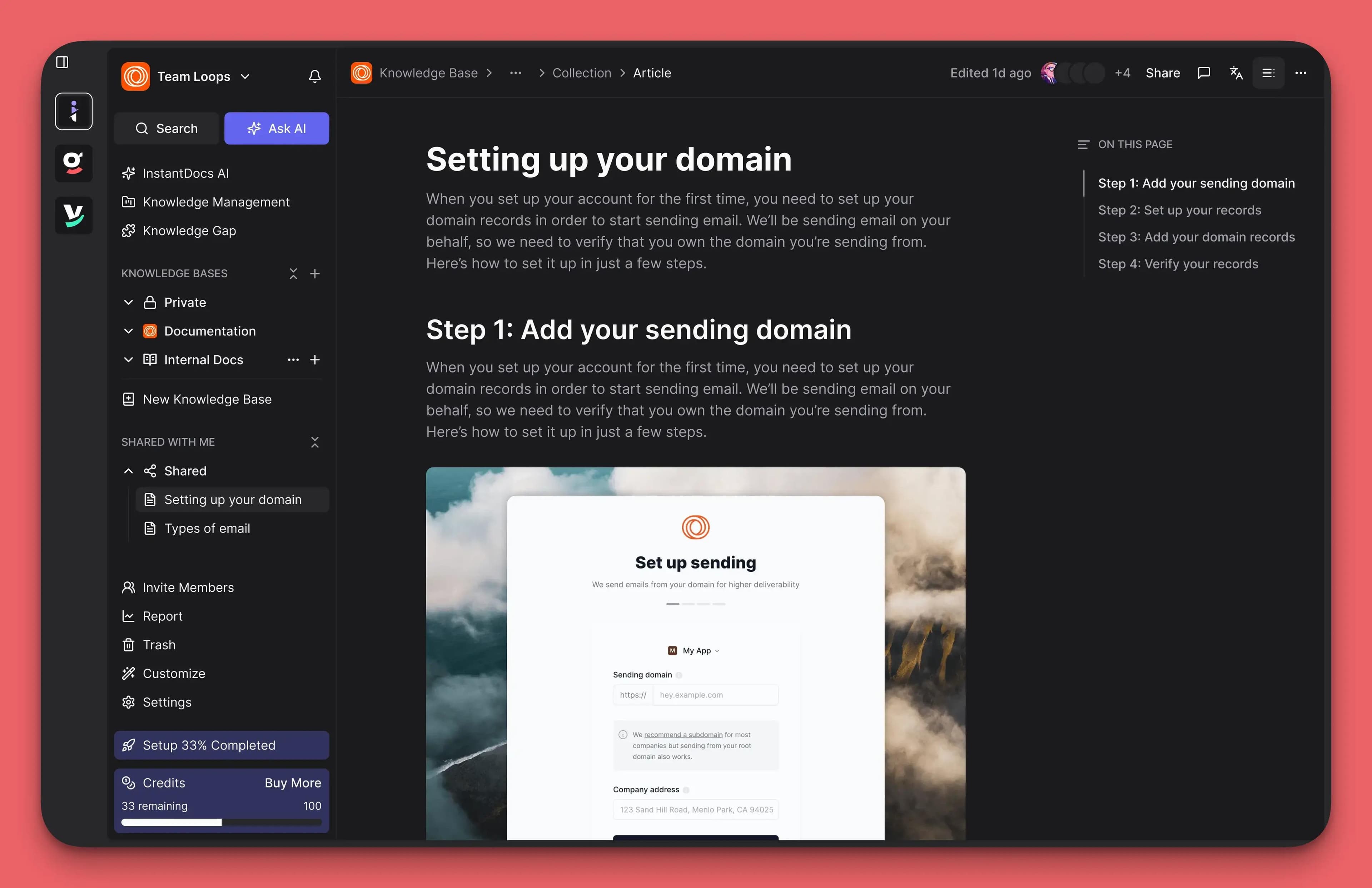
And that’s InstantDocs.
InstantDocs is the best Notion alternative for customer support teams. It's an AI-native documentation platform that converts screen recordings into step-by-step articles and pro how-to videos.
It comes complete with narration and zooms, then publishes them to a customizable knowledge base.
No fiddly formatting. No building a wiki from scratch.
Why InstantDocs is a Better Notion Alternative for Help Docs
- Creation vs. composition. Notion gives you a canvas; InstantDocs generates the content structure for you (steps, screenshots, voiceovers). If your team hates “blank page syndrome,” this matters.
- Built-in, branded KB with AI search, theming, access control, and feedback—things you typically bolt onto Notion (or skip).
- Support-stack native. Publish or sync docs to the tools your agents already live in (Intercom, Groove, etc.) so customers get answers where they ask.
InstantDocs Features
1. Create Step-By-Step Guides Without the Busywork
- Record your screen using the Chrome Extension—InstantDocs automatically captures clicks and actions, then turns them into clear, editable steps.
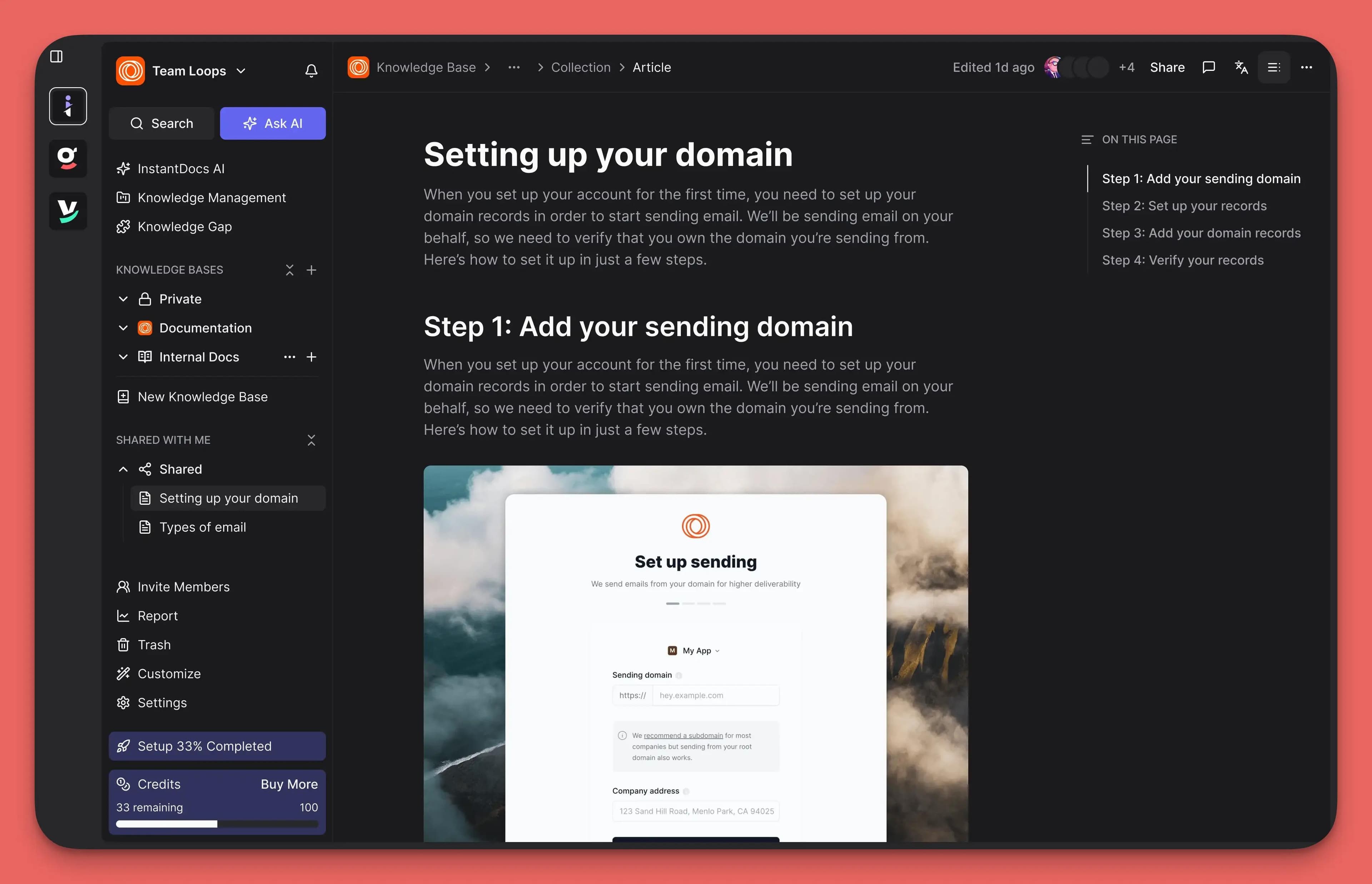
- Import tickets directly from Zendesk, Groove, or Freshdesk and watch them transform into guides without rewriting from scratch.
- Use the built-in rich text editor to polish: add screenshots, videos, embeds, custom layouts, and organize steps.
- Publish anywhere in one click: your KB, onboarding flows, exports, or share links.
2. Turn Workflows Into Beautiful Video Tutorials
- Record your screen once and let InstantDocs add pans, zooms, and transitions for a polished video—no editing required.
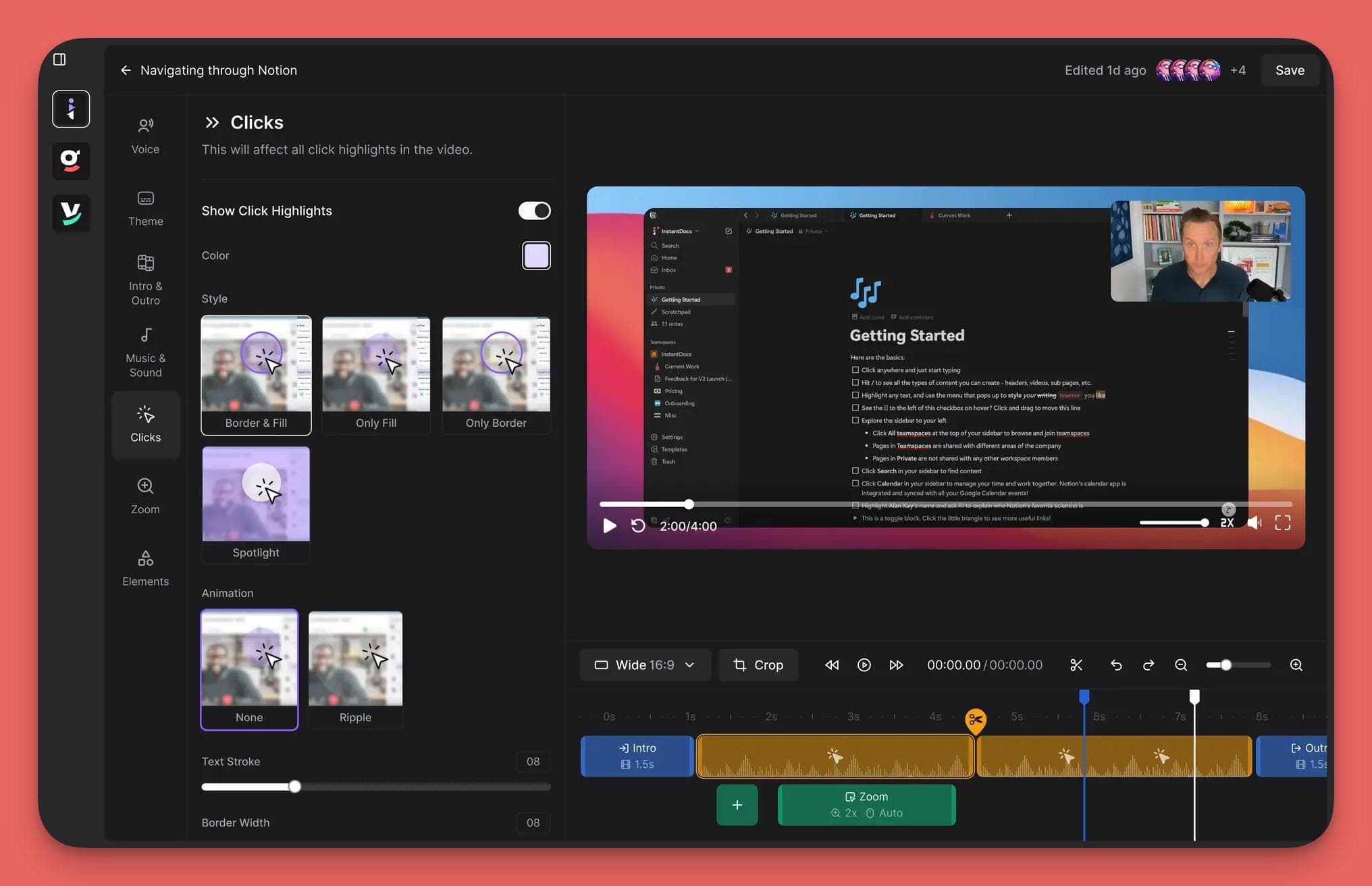
- Generate natural AI voiceovers (or clone your own voice via Eleven Labs) in multiple languages.
- Style videos with annotations, arrows, intro/outro slides, blur tools, and even background music to match your brand.
- Update narration just by editing the text script—InstantDocs re-syncs the voiceover instantly.
3. A Modern, Customizable Knowledge Base
- Launch a branded help center in minutes with full control over layout, fonts, colors, and domain.
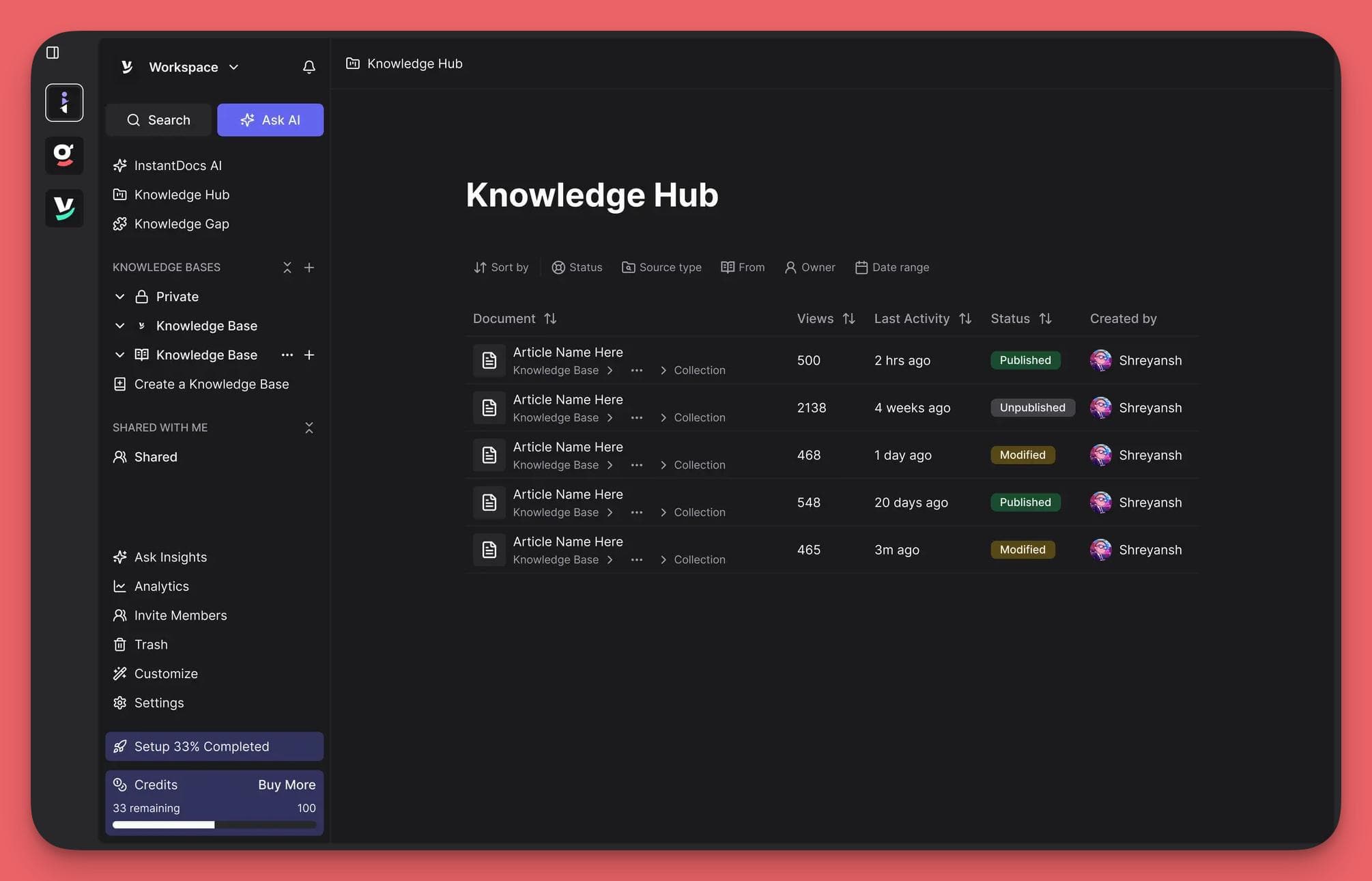
- AI-powered search delivers intent-based results (not just keyword matches), making docs actually findable.
- Organize at scale with collections, sub-collections, and nested structures.
- Built-in analytics show page views, popular searches, and engagement, so you know what’s working.
- Serve global users with 40+ languages, plus instant localization and SEO optimization.
4. Plays Nicely With Your Support Stack
- Native integrations with Intercom, Groove, Zendesk, Freshdesk, HelpScout, and Crisp.
- Publish guides into the tools your agents and customers already use—no messy copy-paste.
Pros
- Documentation that builds itself—30× faster than writing guides in Notion.
- Professional knowledge base out-of-the-box (search, analytics, multilingual).
- Video + voiceovers without expensive editing software or production teams.
- Integrates directly with the support tools you already rely on.
Cons
- Not meant for general-purpose notes or project planning like Notion.
- Best as a dedicated help doc and tutorial platform, so you may still want Notion (or another tool) for broader workspace needs.
Best For
SaaS teams, support leaders, and product squads who want to deflect tickets with clear, professional docs and tutorials without hiring a dedicated tech writer.
Alternative #2: Slite
What it is – Slite is a collaborative documentation tool that aims to provide a simpler, more organized alternative to Notion.
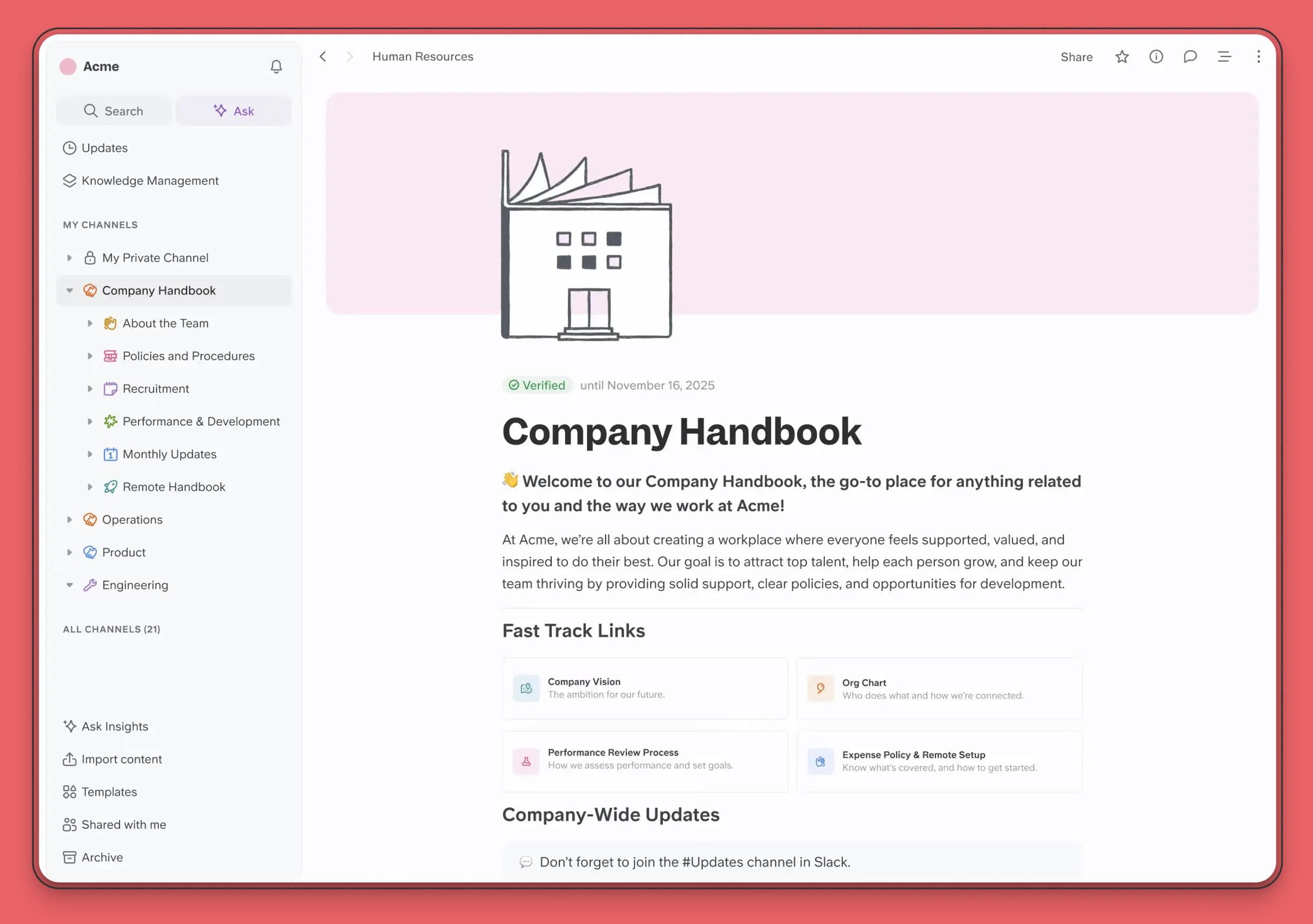
It uses a minimal what you see is what you get (WYSIWYG) editor similar to Notion and supports inline embeds and databases.
Features
- Simple, distraction-free editor – feels like writing in a doc instead of wrangling blocks.
- Verified knowledge – lets you mark docs as up-to-date or outdated, so teams know which info to trust.
- AI-powered improvements – Slite has leaned into AI to suggest edits, restructure docs, and help with clarity.
- Integrations – connects with Slack, Asana, and other core team tools.
- Customizable spaces – organize knowledge into channels/collections that are easier to browse than Notion’s nested pages.
Pros
- Easier to learn than Notion (lower learning curve).
- Clean, uncluttered interface that encourages writing.
- Affordable for small-to-mid sized teams.
- Faster performance compared to Notion when handling team docs.
Cons
- Performance issues with long documents: Users report lag and sluggishness when handling large docs, which can feel frustrating during editing sessions.
- Limited integrations and no developer API: While it connects with common tools, Slite lacks deeper, custom integrations and an API—so if your workflow needs automation or syncing with niche tools, it’s a no-go.
- No built-in task management: Unlike Notion or ClickUp, you can’t track tasks directly in Slite. Therefore, you’ll need another tool for workflows.
- Copy-pasting loses formatting: Shown content doesn’t always transfer cleanly to other platforms. So you can expect some manual fixes.
- Resource-intensive and laggy UI: On older machines, Slite can hog resources, leading to slow loading times or lag when browsing boards.
- Formatting and document setup quirks: Some users say styling options are basic and creating structured FAQs or knowledge bases isn’t intuitive by default.
- Pricing scales up with team growth: The free plan covers basics, but pricing can rise quickly as storage and feature needs expand.
Best For
Teams who just want a straightforward internal wiki—meeting notes, decisions, processes—without the temptation to overcomplicate things.
Alternative #3: Nuclino
What it is – Nuclino is a lightweight, unified workspace designed to make note‑taking and knowledge management fast.
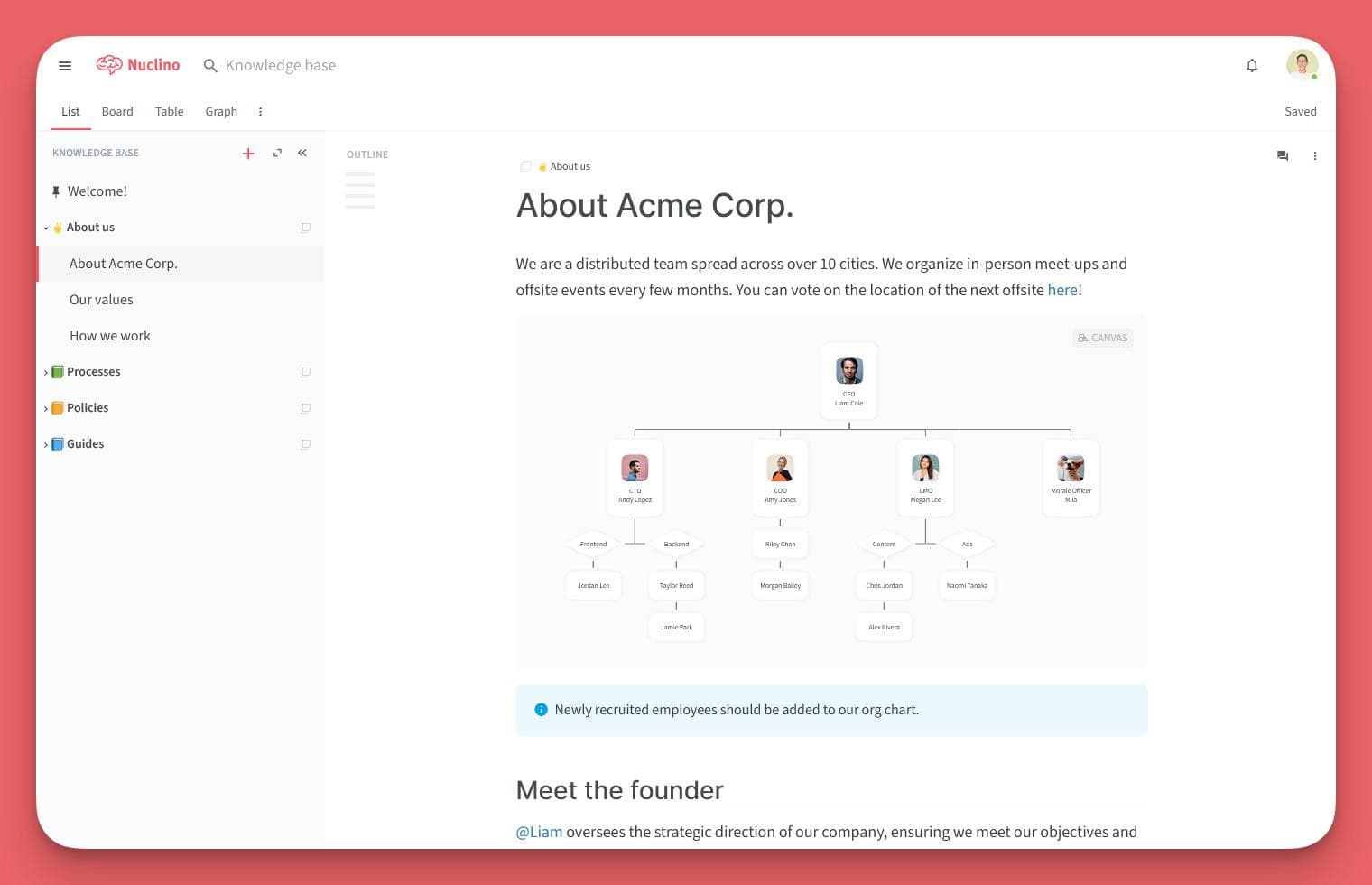
It combines real‑time collaborative editing with project management features.
The platform provides different views (list, board, table and graph) and uses Markdown shortcuts for efficient formatting.
Features
- Knowledge Pages: Collaborative docs for ideas, project details, and internal documentation.
- Real-Time Collaboration: Multiple people edit together—no version conflicts.
- In-Content Feedback: Comment directly on specific sections of a page.
- Visual Organization: Navigate docs with list, graph, or board-style views.
- Permissions Management: Granular access controls for individuals or groups.
- Cross-Linking: Build a web of connected docs instead of siloed folders.
- Markdown & Rich Text: Format easily with Markdown, or use the editor for images, embeds, and code blocks.
- Version History: Roll back to earlier drafts anytime.
- Search Functionality: Lightning-fast search across all workspaces.
- Integrations: Connect with Slack, Google Drive, GitHub, and more.
- Task Management: Assign tasks and deadlines inside docs.
- Mobile & Desktop Apps: Access across Windows, macOS, iOS, and Android.
- Custom Templates & Export: Use ready-made templates and export to PDF/Markdown.
- API Access: Automate workflows and build custom integrations
Pros
- Fast and intuitive: Nuclino is built for speed, offering near‑instant search and minimal latency.
- Users on praise it as replacing multiple tools with “virtually no learning curve.”
- Multiple visualization options: Graph view helps users see relationships between pages and concepts.
- Simple pricing: Fewer features mean lower costs and easier budgeting compared to Notion’s pricing tiers.
- Good for small teams and note‑taking: It’s ideal for simple wikis, meeting notes and lightweight project tracking.
Cons
- Limited formatting capabilities: If you like crafting beautiful documents with varied styling, Nuclino’s formatting tools feel basic and restrictive.
- Accidental edits happen easily: The platform’s fluid editing environment is fast, but prone to unintended changes when you're not careful.
- Misleading free trial experiences: Despite claims of no credit card requirement, some users were forced to provide one.
- Project-switching can be frustrating: Navigating between different team spaces or projects doesn’t always feel seamless.
- Limited integrations and storage constraints: It lacks deep integrations, and there’s talk of modest file storage caps, especially in the free plan.
- No offline access for full content editing: While there’s limited offline support, you can't edit all content without an internet connection.
- No reporting or analytics built-in: You get no insights on page views, team engagement, or content gaps, leaving you flying blind.
Best For
Teams that want a lightweight, visual, and fast wiki for knowledge sharing—especially product or marketing teams that value speed and clarity over “do-everything” complexity.
Alternative #4: CODA
If Notion is the “everything app” for notes and wikis, Coda is the one that turns your docs into mini-apps.
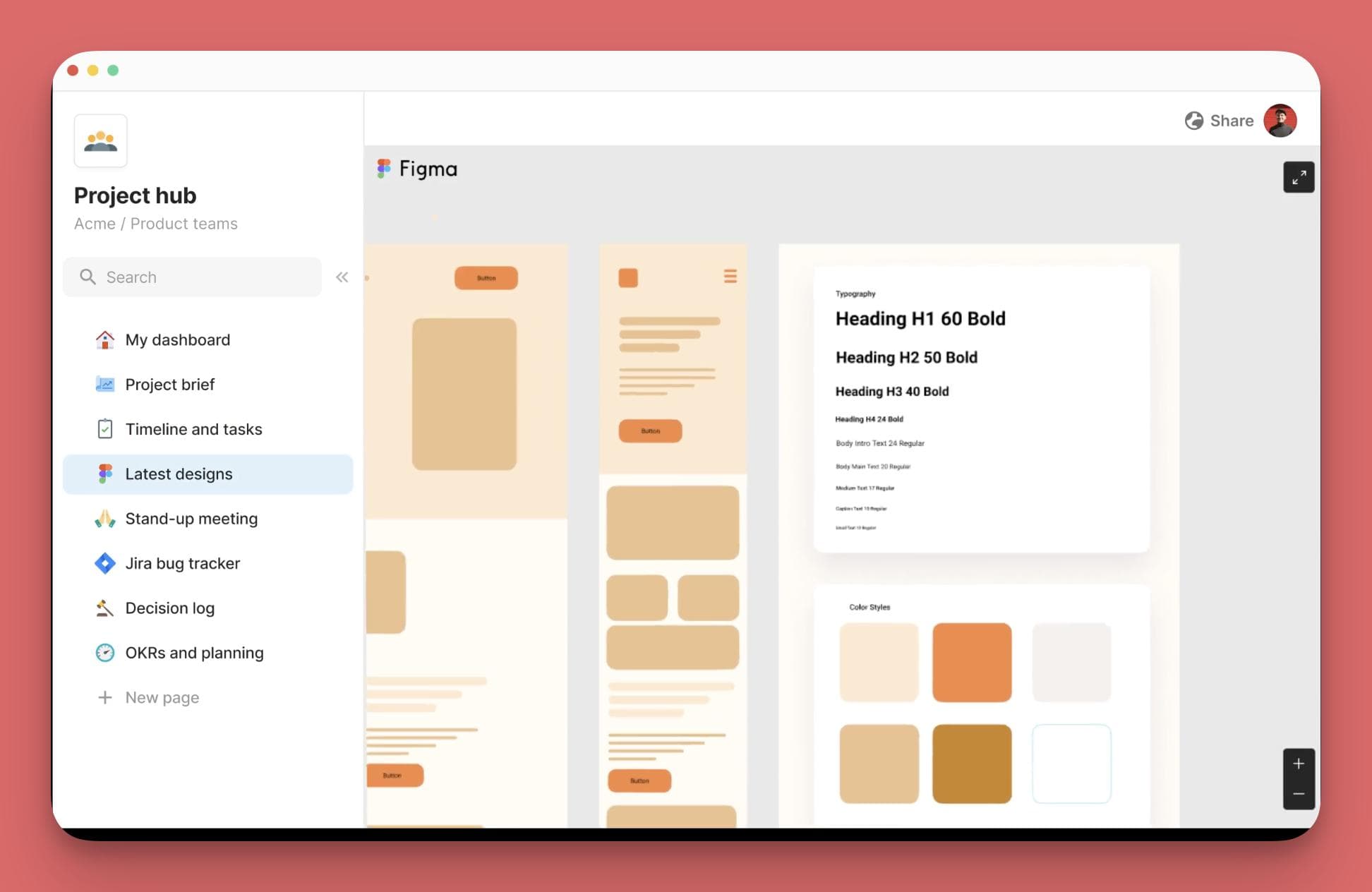
It’s not just text on a page—you can build databases, automate workflows, and even replace lightweight software tools with a single Coda doc.
It’s more technical than Notion, sure, but if your team lives in spreadsheets and wants power + automation, Coda hits different.
Features
- Docs + Spreadsheets + Apps in one: Write text, build tables, and embed app-like elements all in one canvas.
- Tables as databases: Filter, formula, and turn any table into a board, timeline, or Gantt chart.
- Packs (integrations): Over 600 connections like Slack, Gmail, Jira, GitHub, and more.
- Automations & Buttons: Create one-click actions (e.g. “Send reminder,” “Update record”) without code.
- AI Assistant & Coda Brain: Ask questions, summarize content, or generate text natively using natural language.
- Real-time collaboration: Real-time editing, comments, mentions, and fine-grained permissions.
- Custom templates & views: Use pre-made templates (roadmaps, OKRs) or customize views per need.
- Version history & exports: Restore prior versions or export docs as PDF, CSV, or Excel.
- Publish docs publicly: Share polished docs as public websites with custom URLs and basic analytics.
- Advanced formatting & interactive elements: Callouts, collapsibles, buttons, embeds, reactions—visuals that do more than look nice.
- Workspace organization & admin tools: Separate by team/project, with dashboards and activity tracking for admins.
Pros
- Extremely powerful. Combines docs, tables, workflows, and visuals in one platform.
- Integrated automation. Cut down on external tools by building triggers and buttons directly in your doc.
- Deep integrations. Packs let docs play nice with nearly any tool your team already uses.
- Flexible views. Flip tables into boards, calendars, or Gantt charts depending on your needs.
Cons
- Steep learning curve. Formulas, automations, and Packs can feel like learning a new language.
- Overkill for simple use cases. If you just need a wiki, Coda may be too much.
- Performance lag with huge docs. Complex tables and automations can slow things down.
- Less intuitive for first-time users. Not as straightforward as Notion for new users.
- Costs add up. Advanced automation and Packs often require higher-tier plans.
Best For
Teams that live in spreadsheets and need their docs to work for them—not just sit there. Ideal for operations, product, marketing, and project teams that want notes, data, and workflows, all in one place.
Alternative #5: ClickUp
ClickUp is a versatile project‑management platform that integrates tasks, docs, goals, chat, time‑tracking and automation in one interface.
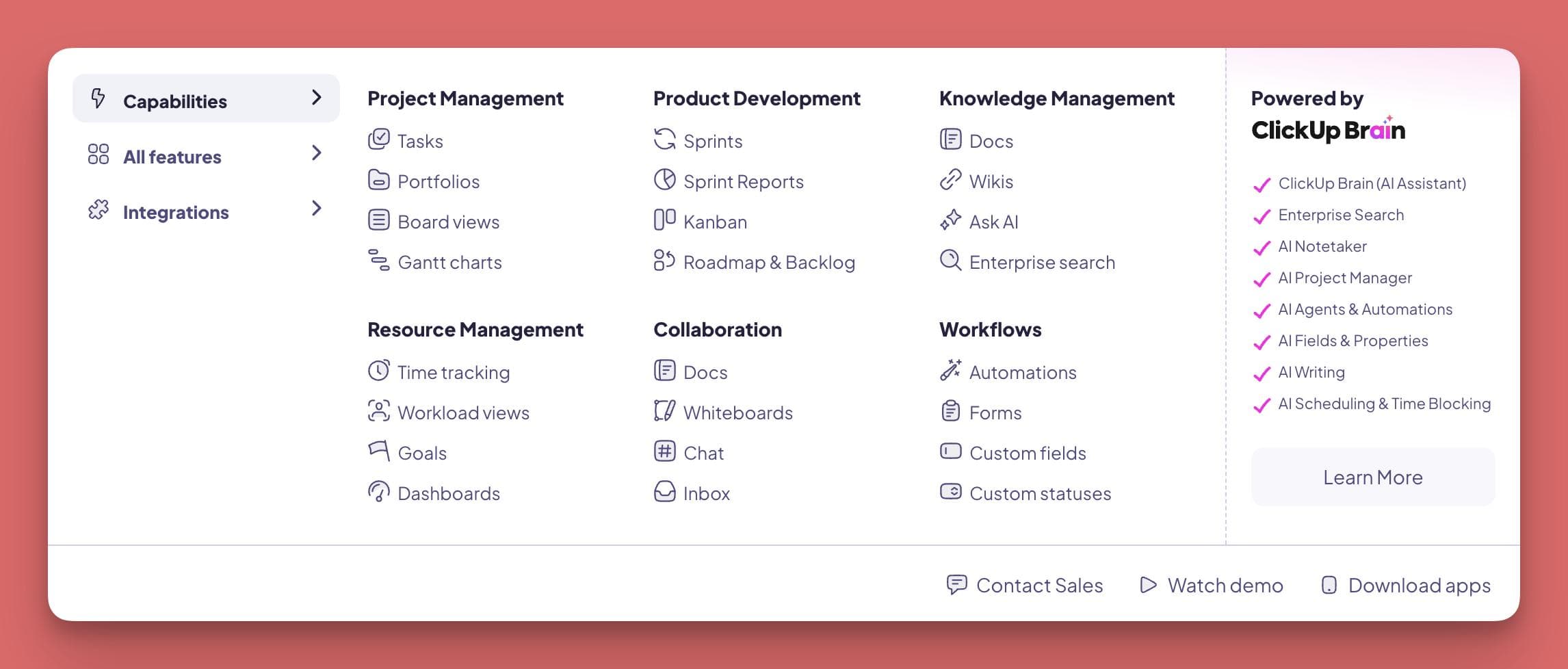
It offers numerous views, including lists, Kanban boards, calendars, Gantt charts and mind maps. It also offers collaboration tools like chat, whiteboard and comments.
ClickUp integrates with over 50 apps and offers a generous free plan.
Features
- Task Management: Customizable tasks with subtasks, assignees, priorities, and automations.
- Multiple Views: Over 15 views like Kanban, Gantt, Calendar, and Dashboards for task visualization.
- Collaboration: Real-time chat, whiteboards, and document collaboration with comments and action items.
- Docs and Wikis: Create, edit, and organize documents with AI-powered search and proofing.
- Time Tracking: Track time, manage workloads, and sync with calendars.
- AI Features (ClickUp Brain): AI assistant for summaries, task automation, and content generation.
- Reporting: Custom dashboards, goal tracking, and analytics for project insights.
- Customization: Flexible hierarchy, custom fields, statuses, and over 35 ClickApps.
- Integrations: Over 1,000 integrations (e.g., Slack, Google Drive) and API access.
- Accessibility: Web, desktop, and mobile apps with shortcuts and offline support.
- Free Plan: Unlimited tasks and users with robust features; paid plans unlock advanced options.
Pros
- Comprehensive feature set: ClickUp offers task management, docs, whiteboards, mind maps and automation in one app.
- Affordable and generous free tier: The platform’s free plan supports unlimited users with some feature limits, and paid plans are inexpensive.
- Strong collaboration tools: Dedicated chat, comments, real‑time editing and whiteboards make it suitable for teams.
Cons
- Steep Learning Curve: Complex setup for organizing Docs and Wikis.
- Inconsistent Search: AI-powered search can be slow or miss relevant results.
- Clunky Document Management: Less intuitive than dedicated tools like Notion, with cumbersome permissions.
- Performance Issues: Slowdowns with large knowledge bases or complex wikis.
- Limited Specialized Features: Lacks advanced version control, tagging, or deep AI insights.
- Fragmented Integrations: External content syncing can feel disjointed.
- Cluttered Interface: Task-heavy design may distract from knowledge management.
Best For
ClickUp is best for teams that manage complex projects and want an affordable platform with rich project‑management features.
Get Started with InstantDocs Today!
While tools like Notion, Nuclino, Coda, and ClickUp each bring something to the table, none are built from the ground up to eliminate the biggest bottleneck in scaling support—manual documentation.
That’s where InstantDocs stands apart.
With InstantDocs, your team can instantly turn processes, recordings, and workflows into ready-to-use documentation. Pair this with a Helpdesk software like Groove and you have a seamless support powerhouse.
Stop Doing Double the Work. Turn one screen recording into a polished video tutorial, a step-by-step article, and annotated screenshots in minutes with InstantDocs.
SaaS teams are already achieving great results with InstantDocs:
- Conzent ApS cut their documentation creation time by 90%.
- Busable saved over 93 hours by plugging InstantDocs directly into their development workflow.
- C2Keep launched a clean, branded knowledge base in days, not months.
Ready to see how you can cut your documentation time and launch features without the headache?
Get a FREE demo here!
Frequently Asked Questions (FAQs)
1. What is a good alternative to Notion?
The best alternative to Notion is InstantDocs.
2. What are the top Notion alternatives?
The top Notion alternatives are InstantDocs, Nuclino, Coda, and ClickUp.
3. What is the best Notion alternative for customer support?
The best Notion alternative for customer support is InstantDocs, especially when used with GrooveHQ helpdesk software.
4. Which is better, Notion or ClickUp?
ClickUp is better for project management, while Notion is better for documentation.
5. What is the best free alternative to Notion?
The best free alternative to Notion is ClickUp, thanks to its generous free plan.